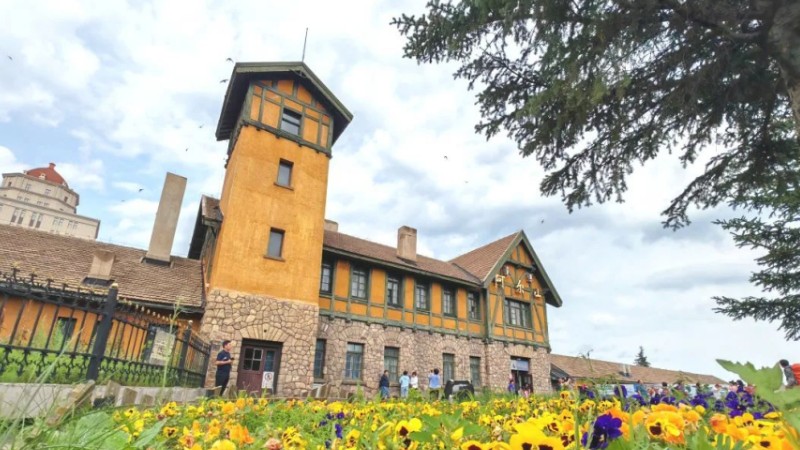Let world hear more BRICS voices, witness greater BRICS contributions
The 15th BRICS Summit is scheduled to run from August 22 to 24 in South Africa.
During the summit, BRICS leaders will conduct discussions on such topics as strengthening BRICS cooperation and expanding the BRICS mechanism.
South Africa has invited tens of leaders from Africa and emerging markets and developing countries (EMDCs) to attend relevant dialogues.
More and more countries are applying to join the BRICS mechanism. During the summit, leaders from EMDCs will discuss a wide range of topics.
This fully demonstrates that the BRICS mechanism, with growing influence and attractiveness, has gained widespread recognition and support.
As the world is undergoing changes unseen in a century, EMDCs are playing an increasingly important role in global governance.
I
South Africa's BRICS Sherpa Anil Sooklal described BRICS as an "inclusive" organization that has always been open to dialogue with the larger global community. According to Sooklal, over 40 countries have expressed interest in joining the BRICS mechanism, and 20 more of them have submitted official applications.
The BRICS mechanism emerged amidst the historical trend of the collective rise of EMDCs. It represents the direction of evolution and adjustment of the global landscape and international order.
Over the past 17 years, by upholding the spirit of openness, inclusiveness and win-win cooperation, the BRICS countries have strengthened solidarity and collaboration, advocated fairness and justice, and pursued common development, continuously expanding their global influence.
Amidst a turbulent international situation, anti-globalization sentiments are escalating while unilateralism and protectionism are distinctly on the rise. The global economic recovery remains weak amid frequent regional conflicts and unrest.
Global governance challenges in spheres like energy, food, and climate are interlinked with regional security risks, while deficits in peace, development, security and governance are increasing globally.
"BRICS countries are attracting people who seek peace and cooperation," said Venezuelan President Nicolas Maduro. His remarks underscored an important reason why many countries hope to join the BRICS mechanism.
The BRICS cooperation has always been oriented towards openness, inclusiveness and win-win cooperation, and opened its door to all EMDCs aspiring to seek development while maintaining independence.
The 2013 Summit in Durban of South Africa invited African leaders to participate in the dialogue.
The 2014 Summit in Fortaleza of Brazil invited leaders of South American countries to join the dialogue.
During the 2015 Summit in Russia's Ufa, a meeting was held between the Shanghai Cooperation Organization (SCO) members and observers, the Eurasian Economic Union (EEU) leaders, leaders of invited countries and the BRICS countries.
A dialogue between BRICS leaders and the leaders of the member countries of the Bay of Bengal Initiative for Multi-Sectoral Technical and Economic Cooperation (BIMSTEC) was held during the 2016 Summit in Goa of India.
And during the Xiamen Summit in 2017, China put forward the innovative "BRICS Plus" cooperation model, building a new platform for solidarity, cooperation and common development of the vast developing countries.
The BRICS cooperation does not engage in exclusive "small circles." Last year, the group started a new round of expansion.
BRICS cooperation is an innovation. It transcends the old pattern of political and military alliances and pursues a new relationship of partnership featuring non-alignment; it transcends the old mindset of drawing lines by ideology and takes a new path of mutual respect and common progress; it gets rid of the old game of "One's gain is another's loss" and winner-takes-all mindset and practices the new concept of mutual benefit and win-win cooperation.
BRICS has become a model for EMDCs to carry out South-South cooperation and attain self-reliance through solidarity.
The BRICS countries have achieved success and progress without relying on other nations to serve their own interests, said Spanish news agency Agencia EFE.
The BRICS countries' decisive role in advancing major global agenda will make the world more just and stable, and calls for their explicit support will likely intensify, according to the article.
II
The BRICS mechanism has formed a multi-level, wide-ranging and all-round cooperation framework, becoming a major platform for exchanges, dialogues and cooperation among developing countries in politics, economy, finance, development, culture and other areas.
The steady augmentation of the BRICS countries' economic strength provides the foundation for the rapid advancement of BRICS cooperation.
According to data provided by Acorn Macro Consulting, a UK-based macroeconomic research firm, in 2022, the BRICS countries accounted for 31.5 percent of the global economy, surpassing the G7 share of 30.7 percent. This gap is expected to be widened by 2025, the data showed.
The macroeconomic stability of the BRICS countries has laid an important foundation for the enduring attractiveness of the BRICS mechanism.
The BRICS countries are committed to promoting economic recovery.
The intertwined impact of the COVID-19 pandemic and the Ukraine crisis has led to disruptions in the global industrial and supply chains, a continuous rise in commodity prices, and increased fragility of the international monetary and financial system.
The BRICS countries have made vital contributions to global economic growth by steadily advancing cooperation in the areas including currency and finance, trade and investment, as well as energy and resources. They have also continuously expanded cooperation in supply chains, logistics, agriculture, food security, local currency settlement, cross-border payments and other domains.
The BRICS countries focus on common development.
Currently, global development is suffering from severe disruption. The momentum of international development and cooperation is losing strength, the North-South gap is further widening, and the implementation of the UN 2030 Agenda for Sustainable Development has been impeded.
The BRICS countries have made global development a key focus of their cooperation. They have firmly defended developing countries' interests under such multilateral frameworks as the Group of 20 (G20) and the World Trade Organization (WTO), making unremitting efforts to advance the implementation of the UN 2030 Agenda for Sustainable Development.
The BRICS countries insist on exploring new ground.
The world is becoming increasingly information-oriented, while the new round of sci-tech revolution represented by AI is in full swing.
The BRICS countries have advocated a partnership on the new industrial revolution, strengthening cooperation in future networks, industrial internet and digital manufacturing, digital transformation of the manufacturing industry, standardization and other areas.
Keeping pace with the prevailing trends of the digital economy, the BRICS countries have formulated and updated the strategy for BRICS economic partnership, continuously promoting cooperation in education, science, technology and other domains. Such efforts have built a talent pool for sustainable development and innovation cooperation.
In the face of raging torrents and storms, the BRICS countries work together to build a high-quality partnership that is more comprehensive, closer, more pragmatic and inclusive, continuously elevating the influence of BRICS cooperation.
Russian political analyst Timur Fomenko believes the strategic importance of BRICS cooperation is growing because it represents the cooperation carried out by the Global South countries to shape an economic future that is not dominated by Western powers.
III
The growth of the BRICS countries is driving adjustments in the international landscape, fundamentally changing the political and economic map of the world.
In an article published by the European website Modern Diplomacy, the rise of the BRICS countries is viewed as a new world order and a shift in power to the "Global South."
The reform of the global governance system is at a historic turning point. EMDCs are experiencing rapid growth, continuously expanding their influence on the international stage.
In the face of growing global challenges, the West-led world order, which is characterized by post-colonial order, double standards, and neglect of developing countries' concerns, does not truly meet the common needs of EMDCs to pursue peace, development and cooperation.
The mindset of certain Western powers, operating under the guise of a so-called "rules-based international order," has become an impediment to global economic development and social progress.
The BRICS countries champion true multilateralism, making decisions founded on the principles of equality and consensus.
As a representative outcome of BRICS cooperation, the New Development Bank adopts a unique governance structure, in which the five founding members have equal shareholding power and voting rights. This provides a new option for the governance of multilateral development financial institutions.
The BRICS countries have made important contributions to advancing a more just and rational international order by considering the creation of a new reserve currency based on a basket of currencies of member countries, launching a new round of expansion, and inviting non-BRICS countries to discuss digital economy issues.
The BRICS countries actively promote reform of the global governance system, striving to increase the representation and voice of EMDCs.
To handle incessant traditional and non-traditional security threats, the BRICS countries support each other on issues involving their core interests, preferring dialogue instead of confrontation.
In various global multilateral mechanisms, including the UN, the G20, the WTO, the International Monetary Fund (IMF) and the World Bank, the BRICS countries have actively strengthened policy dialogues and position coordination. They ensure that their voice is heard and solutions are provided, thereby promoting constructive reform of the international system.
"Above all, BRICS defends multipolarity and multilateralism ... By defending multilateralism, BRICS countries are countering the concept of the Cold War and opening up the possibility of a more equitable and just international economic order that benefits the world," Cuban President Miguel Diaz-Canel said recently.
The BRICS cooperation is the most important platform for solidarity and cooperation among developing countries. As the core mechanism representing countries of the South, it embodies the earnest expectations of developing countries.
Under the new circumstances, the BRICS countries must stand on the right side of history, stand for the advancement of human civilizations, pursue development and foster cooperation.
By advancing the BRICS mechanism, they can make new contributions to driving world multipolarity, economic globalization, and democratization of international relations, so that the world can hear more BRICS voices and witness greater BRICS contributions.
Photos
 View of Great Wall at starry night in N China
View of Great Wall at starry night in N China Groom in C China's Luoyang picks up bride with electric moped fleet
Groom in C China's Luoyang picks up bride with electric moped fleet Small railway station in N China's Inner Mongolia attracts throngs of tourists
Small railway station in N China's Inner Mongolia attracts throngs of tourists 'Space suit'-clad tourists immerse themselves at extra-terrestrial-like landscape in China's Inner Mongolia
'Space suit'-clad tourists immerse themselves at extra-terrestrial-like landscape in China's Inner Mongolia
Related Stories
- Commentary: BRICS gains charm as global dynamics shift
- Season II of Classics Quoted by Chinese President Xi airs in Africa
- Interview: BRICS plays global role in balancing int'l relations, says Brazilian expert
- Johannesburg ready for 15th BRICS Summit
- Indian PM Modi leaves for visit to South Africa, Greece
Copyright © 2023 People's Daily Online. All Rights Reserved.





